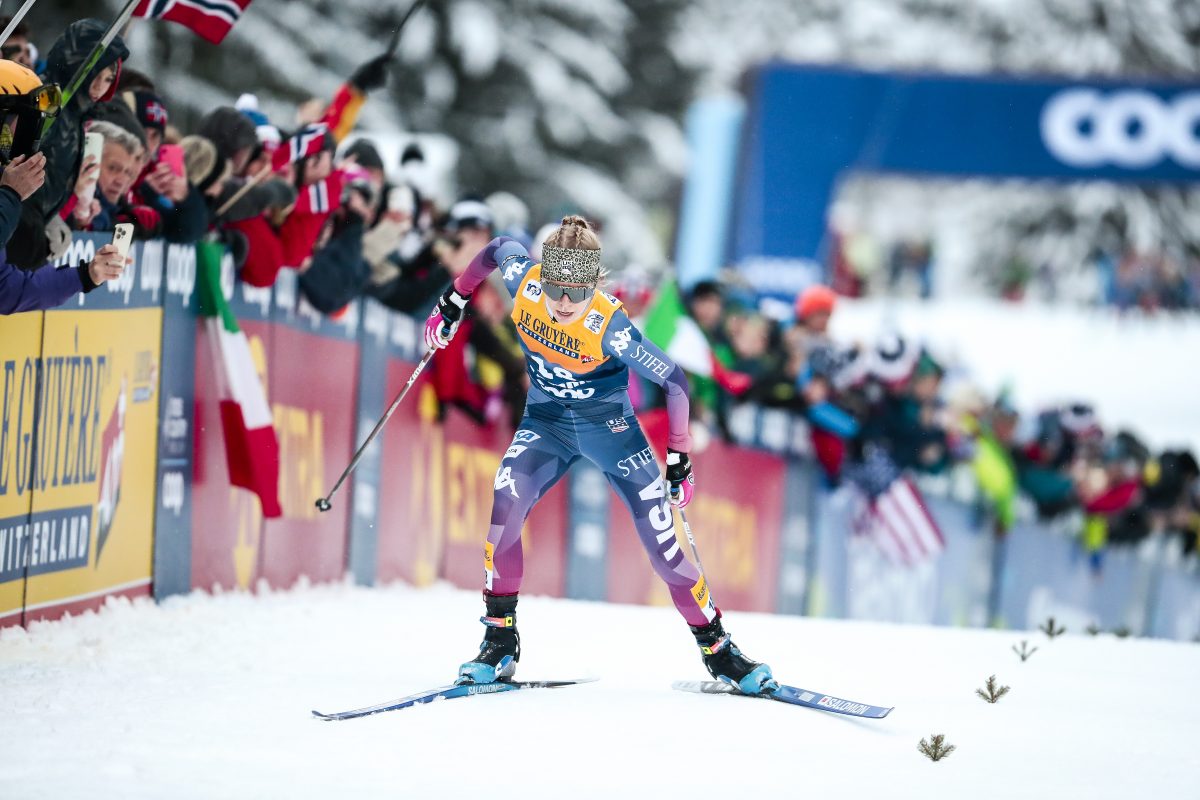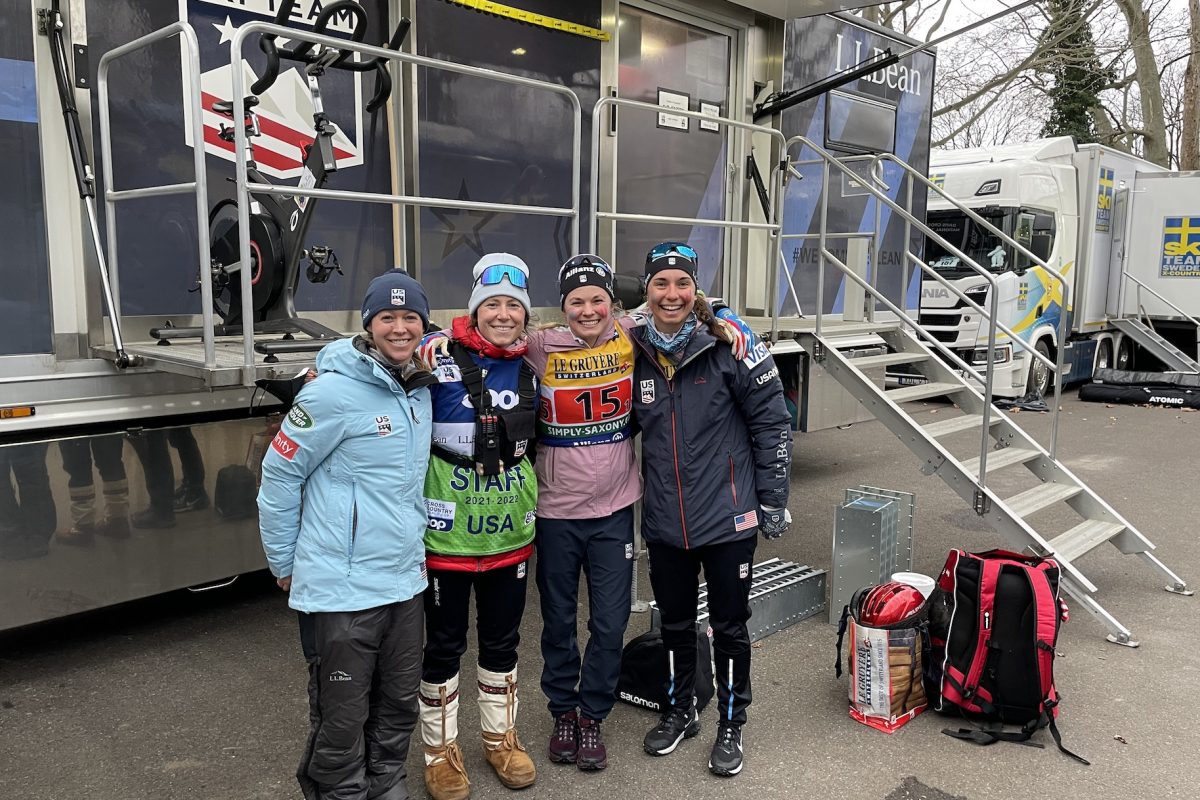
As Vincent Vittoz’s career drew to a close in the late 2000’s, French skiing needed a breath of life – and it found it in a group of young racers led by Maurice Manificat. A several-time junior national champion and a member of the bronze-medal relay at 2005 World Junior Championships, Manificat stepped up to earn another bronze medal in the U23 30 k in 2008 and his first World Cup podium a year later.
Since then he has been constantly hovering near the top of the World Cup, with one win, six other podiums, and similar results in the Tour de Ski and mini-tours; he has also finished sixth in both the Olympics and World Championships. In 2012, Manificat finished the World Cup season ranked eighth overall. For the upcoming season he has said that his biggest focus is the World Championships in Val di Fiemme, specifically the 15 k skate race.
But skiing isn’t the only thing on the Frenchman’s plate: he’s also a student, currently enrolled in a Masters program in biology at the University of Grenoble. After taking five years to complete his License (the equivalent of an American bachelor’s degree), Manificat is working through a new program called Inter’Val, which is designed specifically for high-level skiers of various disciplines. Not only does it feature a schedule optimized for “asynchronous” student-athletes, it also specializes with tutoring and distance learning courses. Inter’Val currently has about 40 students, all of whom are required to compete at the highest level of international sport in order to qualify for the program.

FasterSkier snagged Manificat for an interview over e-mail about what it’s like to be a French skier and how he balances school with a successful athletic career. The following has been translated and condensed.
FasterSkier: You were very successful at the junior level. After that, did the national team offer you a place, or how did you decide what to do?
Maurice Manificat: I basically finished as the top junior in France and I won the junior classification of the OPA Cup, so I obtained a place on the French “B” team for the 2006-2007 Continental Cup season. I was unfortunately the only first-year senior in the national team group that year. I was a freshman at the University during my last season as a junior, having made my return in September 2005 after passing my baccalaureate.
FS: Did other top skiers go to University? What did other skiers and coaches think of that decision?
MM: I wasn’t the first skier at University. Most of my fellow junior racers entered University like other people our age. For several years at the University of Annency there had already been a class specially arranged for top-level skiers and snowboarders, but it was a specialized DUT in the beginning. [Note: DUT is a Diplôme Universitaire Technologique, an intense, two-year degree that can be quite selective and involve more lectures than a normal university course.]
At Premanon, there were correspondence classes. But at Grenoble, in the faculty of science, there wasn’t any special arrangement for skiers. I was the first cross country skier to be able to benefit from having the courses arranged as they were with Inter’Val. Specifically at Grenoble, we have face-to-face courses where we saw the professors. I integrated into the Université Joseph Fourier for the Licence Sciences et Technologies program along with an alpine skier who had gone to the same ski academy as me. The program wasn’t as significant then – this is just the second year since “Inter’Val” began. Now, other cross country skiers followed as well.

Certain skiers thought I was crazy. The coaches thought it was good to be able to take advantage of the new program.
FS: When you went to University, did you have a coach there? Were there other skiers for you to train with?
MM: There aren’t coaches at the University. Our trainers are the national team coaches, but they aren’t at the University. Most of the skiers there are autonomous, and each has his own training plan made with national team coaches. Each of the student-skiers has a different course to follow, and different teachers, so the schedules and time constraints are different. As a consequence, we train alone, but in the past few years more and more students were grouped into the same year and the same course, so they can train together. For my part I often train alone. I like to train alone because when I am with the national team, we train together.
FS: How much time did you actually spend at the university from 2006 to 2011, when you were getting your bachelors degree? You must not have had the same calendar as other students.
MM: I’m at school from the beginning of September to the beginning of November, just before the first World Cups. Then from April to the beginning of June. So I am free for the summer training period, which is very intense, and for the winter competition season. It’s an arrangement “à la carte.”
FS: Did your professors understand what you wanted to do, or was it difficult to explain to them why you weren’t always there?
MM: It’s always complicated to clearly explain to professors how I train and my constraints. Despite that, the majority were understanding. After all, the faculty members themselves have very busy schedules, so we understand each other. We often actually find them to be lions of sympathy. Because we have private lessons, we have more time to be casual with them and to talk about what we are doing, them about their research and us about our sport. It’s very enriching for both sides.
FS: When you began competing on the World Cup, or for instance when the Olympics were approaching, did you have to change your study plans or even reconsider your path? Did any of the national team staff suggest that you leave your studies?
MM: None of the coaches or the federal staff asked me to quit University. They saw that I was able to manage the two, and more than that to do so very well. Moreover, in the year of a big event like the Olympics or the World Championships, I try to alleviate my University commitments. Basically, when we are planning my course at the university with the professors and tutors, the main focus is my sport. So in the years of the Olympics or the World Championships I take a lighter course load.
FS: Today, are you completely with the national team, or do you have a personal trainer?
MM: My coaches are the national team coaches; it’s with them that I make my training plan, and select what areas I work on. And more than that, as I accumulate years of experience I know what I have to do. Sometimes I do ask the advice of my club coach or other trainers that I have had in the past. But I’m mostly someone who likes my independence.
FS: How does the national team work – do you only train together at camps?
MM: At a camp, we train together, that’s the point: so that each one progresses, and can push his limits while inspiring his teammates. On the other hand, we don’t all live in the same place, and when we aren’t at a camp we train alone or with other skiers who live nearby.
FS: Why a masters degree – what are you hoping to do when you finish with sports?
MM: My masters is the next logical step after my License (a Bachelors in America, I think). I don’t want to stop my studies and a License won’t open very many doors down the road. When I finish my athletic career, I’m still not quite sure what I will do. It’s whether that I will join the operational service of French Customs (who is my actual employer now) in a capacity that corresponds to by studies in biology, for example in the Customs laboratories, or whether I will become a national team coach, whether I will work in a laboratory as an extension of my studies in biology, or some other career in biology.
FS: In the U.S., one must complete a “thesis” for their masters, which is more research-oriented and less classes. Is this the same in France? Will this be easier or more difficult to coordinate with your athletic schedule?
MM: In France, a masters is two years: mostly courses in the first year with a seven-week stage at the end of the year; the second year there are courses in the first half, and then six months in which you can effectively do a research project (depending on what kind of masters, “pro” or “recherche”, you choose); at the end you must make a report and pass an oral defense. I’m in the first year of my masters right now so I’m not confronting this problem yet, but it will be difficult to arrange. It’s in discussion with the teaching staff.
FS: How do you finance your career? Is there much funding through the national team, or must the athletes provide their own support?
MM: I’ve been employed by French Customs as part of the Customs Team of France since 2009. Thus I have the salary of a Customs officer which permits me to contribute to my retirement, because in France high-level sports is not recognized like that. To that I’ve added contacts for with companies for skis (Fischer), poles and gloves (Swix), glasses (Uvex), and my ski station (Grand Massif-Agy). As for the budget of the national team, the budget isn’t sufficient, we have the bare minimum to function professionally, but we are clearly lacking in money. For example: this summer, we didn’t have the benefit of a physiotherapist at our camps, which was very detrimental to our recover and injuries if we had any.
FS: So what do you have to do with Customs, and how to you balance that with your training? Are many skiers part of Customs or maybe the military?
MM: As I said, my contract with Customs allows me to have a salary so that I can be autonomous, since until 2009 it was my parents who financed the majority of my career and gave me some financial aid. On the other hand, I’m completely detached so that I can practice my sport and not the job of a Customs officer, just like in the military. Sometimes the administration asks us to be present at events with our bosses, like in Paris, but it’s rare. These contracts with the French administration are a real support for athletes on the national team in the nordic disciplines. Almost all of the athletes have a contract with either Customs or the Army. It is very important for us and a point of pride.
FS: Finally, for North American fans, will you compete in the World Cups in Canada? How does a trip across the Atlantic fit into your goals for the season, the Tour de Ski, World Championships, etc?
MM: In effect you have asked a question for which I don’t have a response. The calendar is again very complicated this year. I would love to return to Canada, the last time I was there was for the Olympics, but I still don’t know Canmore or Quebec. I would love to be able to race with our “cousins” from across the Atlantic. But unfortunately the calendar of races over there is not very advantageous with the Tour de Ski just afterwards. Jet lag is something that is hard to digest, the distance races were placed at the end of the race block, and thus it is complex. But I haven’t decided anything yet. Val di Fiemme is much later in the season, and it’s the big goal.




